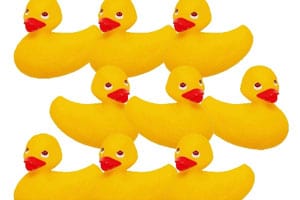
When I was a kid, I learned a lesson at a carnival that I still carry with me when I consider business goal strategies. Think of your goals as moving targets—like shooting ducks at a carnival booth. Before you get laser-focused on hitting them, be sure they’re actually worth pursuing. Some goals, once achieved, don’t bring the rewards you expected.
“Three Tries for a Dollar”
“Three tries for a dollar,” shouted the carnival barker, his voice rising above the din of the midway. “Shoot a duck and win this giant gorilla!”
I eyed the rows of yellow plastic ducks swimming back and forth across the plywood ocean at the back of the booth. The prize—a massive, stuffed gorilla with an affable grin—loomed overhead. It seemed like a great deal at the time.
So, I dug into the front pocket of my jeans, pulled out my last crumpled dollar, and slapped it on the counter. The man with greasy hair snatched it up before it fully landed. I raised the air rifle, sighted down the barrel, and tracked a duck across its path. I pulled the trigger.
The shot sailed high—three inches too high—because the gun was off. Adjusting, I aimed lower for my second shot, only to watch the bullet splash behind the duck. The target had moved forward by the time I compensated. Now I had only one shot left.
This is where business goal strategies come into play.
Business Goal Strategies Start with Knowing Why
Needing to compensate for both the crooked aim of the gun and the motion of the duck, I made a final adjustment—three inches down and a couple of inches ahead of my target. Wham! I nailed the moving duck and won the gorilla.
Momentarily exhilarated, I hoisted my prize—only to discover it smelled like mildew and musty sawdust. The seams were already splitting, and stuffing poked out in places. By the time I reached the exit, I tossed it in the nearest trash can.
That childhood lesson sticks with me. Winning isn’t always rewarding. That’s one problem with setting goals.
What Are You Aiming For?
In your business goal strategies, your targets are constantly in motion, too. Market conditions shift. Consumer preferences evolve. Competition adjusts its strategy. If you’re aiming where the target was instead of where it’s going, you’ll keep missing the mark. Worse, some goals aren’t worth the effort to begin with—just like that moldy gorilla.
Before locking in on a goal:
- Clarify your “why.” Are you chasing a goal because it’s truly valuable, or because it’s simply in front of you?
- Expect to adapt. Just as I had to adjust my aim for a rigged rifle and a moving target, business success requires recalibration.
- Avoid meaningless prizes. Some wins look great at first but deliver no real benefit. Are you working toward something that will genuinely move your business forward?
- Measure your efforts. If you keep missing your target, is it the goal that’s flawed, or your strategy?
Every leader needs to take careful aim. The trick is knowing when to shoot, when to adjust—and when to walk away. You haven’t peaked yet!
Give your people wings and watch your business take off. We provide LIFT. Contact us to learn more.